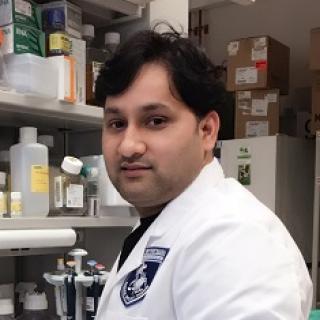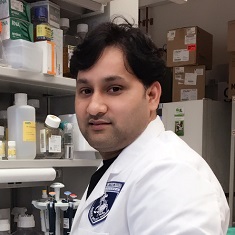
Anand Singh, Ph.D.
- Center for Cancer Research
- National Cancer Institute
- Building 10-CRC, Room 3-5888
- Bethesda, MD 20892-1201
- 240-858-3874
- anand.singh@nih.gov
RESEARCH SUMMARY
Dr. Singh’s current research work involves investigating the regulatory networks comprised of interactions among microRNA (miRNA) and transcription factors in order to gain insight into cancer mechanisms and inspire development of novel therapeutic strategies primarily in malignant mesothelioma. MicroRNA epigenetically regulates multiple genes due to partial complementarity to the 3’UTR region of genes and plays important role in cancer initiation and pathogenesis. Most of the MicroRNA expression is tissue specific and based on its function in cancer categorized as tumor suppressor or oncogene (oncomiR). In mesothelioma, unlike other solid tumors mutation burden is very low and development of tumor is driven primarily by the loss of tumor suppressor genes (CDKN2A, NF2, BAP1, P53 etc), rather than by activation of classic driving oncogenes. Dr. Singh’s current focus is to explore the epigenetic regulatory network of mesothelioma pathogenesis and to develop miRNA based loco-regional therapy for the treatment of mesothelioma.
Areas of Expertise

Anand Singh, Ph.D.
Research
Dr. Singh’s current research work involves investigating the regulatory networks comprised of interactions among microRNA (miRNA) and transcription factors in order to gain insight into cancer mechanisms and inspire development of novel therapeutic strategies primarily in malignant mesothelioma. MicroRNA epigenetically regulates multiple genes due to partial complementarity to the 3’UTR region of genes and plays important role in cancer initiation and pathogenesis. Most of the MicroRNA expression is tissue specific and based on its function in cancer categorized as tumor suppressor or oncogene (oncomiR). In mesothelioma, unlike other solid tumors mutation burden is very low and development of tumor is driven primarily by the loss of tumor suppressor genes (CDKN2A, NF2, BAP1, P53 etc), rather than by activation of classic driving oncogenes. Dr. Singh’s current focus is to explore the epigenetic regulatory network of mesothelioma pathogenesis and to develop miRNA based loco-regional therapy for the treatment of mesothelioma.
Publications
Biography

Anand Singh, Ph.D.
Dr. Singh received his Master’s degree in Biotechnology from the Himachel Pradesh University, Shimla, in 2007, where he was awarded a National Merit-based Biotechnology Scholarship from the Indian Department of Biotechnology. He did his doctoral research in Biochemistry at All India Institute of Medical Sciences, New Delhi, India (2008-2013). During his doctoral research, he was awarded a National AIDS Control Organization (NACO) Research Fellowship from the Indian government for his work on human immunodeficiency virus (HIV). Dr. Singh also received a research fellowship for his research from the University Grant Commission of India. He was awarded a Global Health travel award from the Bill and Melinda Gates Foundation to present his work at an “HIV Vaccine” conference organized by Keystone Symposia (2012). He further received an International Scholarship from the International AIDS Society (IAS) for his work on "HIV Pathogenesis, Treatment and Prevention" (IAS-2013), Kuala Lumpur, Malaysia. Dr. Singh served as General Secretary of the Society of Young Scientists (SYS) of the All India Institute of Medical Sciences, New Delhi. Dr. Singh’s doctoral research on “Modulation of HIV by dsRNA” earned him the best Ph.D. scholar award, “Dr. Arun Fotedar Memorial Award for Ph.D. scholars of AIIMS” in 2013. He joined the School of Natural Sciences at the University of California-Merced in 2014. Dr. Singh joined the Thoracic Surgery Branch at the National Cancer Institute in 2015, as a postdoctoral fellow in Dr. Chuong Hoang’s lab, to gain direct research experience in the field of RNA biology.
